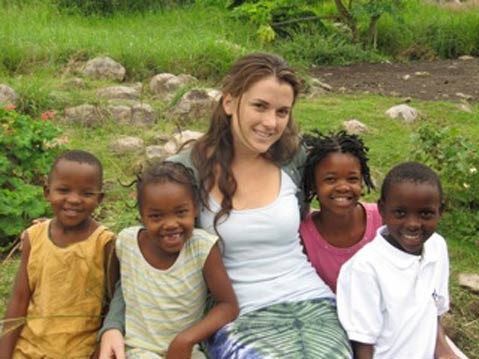Tanzanian Orphanage
S.B. Native Goes to Africa to Run Girls Home

Last fall, Joanne and Doyle Hollister thought their daughter Ashley was about to begin a master’s in social work at NYU. Instead, they got a call telling them she was moving to Tanzania to become the assistant director of the Janada L. Batchelor Foundation for Children (JBFC), one of the first orphanages for girls in that country.
“I’m just so proud of what she’s doing,” said Joanne. “It’s not the largest program in Tanzania, but what they are doing is making significant change.”
In East Africa, Tanzania has more than a million children who have been orphaned by their country’s huge incidence of AIDS and malaria. Tragically, girls end up on the streets or sold into brothels, becoming prostitutes as early as four or five. Rape—not play, not school—is the landscape of their childhood.
Chris Gates, a classmate of Hollister’s at NYU (they worked in a program together at Bellevue), had first visited Tanzania at age 15 and returned every year to do volunteer work at a shelter for homeless boys. Seeing the lack of programs for abandoned and abused girls, he was inspired to start JBFC while still an undergraduate. Located in Kitongo, on the shores of Lake Victoria, the orphanage, which includes a large farm, is a remarkable achievement for a 23-year-old, providing a safe, nurturing home for around 40 girls who are given a place to reclaim their innocence, acquire an education, and learn practical skills.
Gates is particularly proud of developing a potable water program for JBFC. “Women can’t go to school because they have to supply water for the family,” he said. “Equal rights for women really depend on water.” Working closely with the government and the community, JBFC is looking at how to make its own model replicable. “Each campus will be self-sustainable through its agriculture and live stock,” he envisions, “teaching kids how to use the rich resources of their country to make a profit for themselves.”
At JBFC, Hollister is in charge of programming and outreach programs. “In addition to an art program for our new school, we have an art therapy/empowerment program for street children in nearby Mwanza (funded by Santa Barbara-based Rumble Art), a co-op for widowed and abandoned women to produce and sell their local crafts, and teacher-development days for schools in the area,” she said.
Hollister, who played soccer at Santa Barbara Middle School, Cate, and NYU, has started a soccer team and established the first female soccer league in Tanzania. The girls started out playing barefoot in skirts on a dirt field, she said. Since then, her father, who coached soccer for years, has sent much-needed equipment. “We have really good players,” she noted. “It’s amazing how every aspect of their lives has brightened up since starting to play soccer.”
Hollister and Gates readily admit to the joy their work has given them. “I love playing with the girls,” said Hollister. “They are really aggressive and sporty. You wouldn’t think after what they have gone through they would be smiling all day.”
Seeing the changes in these girls who were once cast aside has been their reward. “When they come in, they aren’t children—they’ve had that ripped away,” said Gates. “They have issues and they’ve never studied. But within a few months, it all turns around.” Every child has a story, and thanks to JBFC, it’s a good one.
For more information, visit jbfc-online.org.



